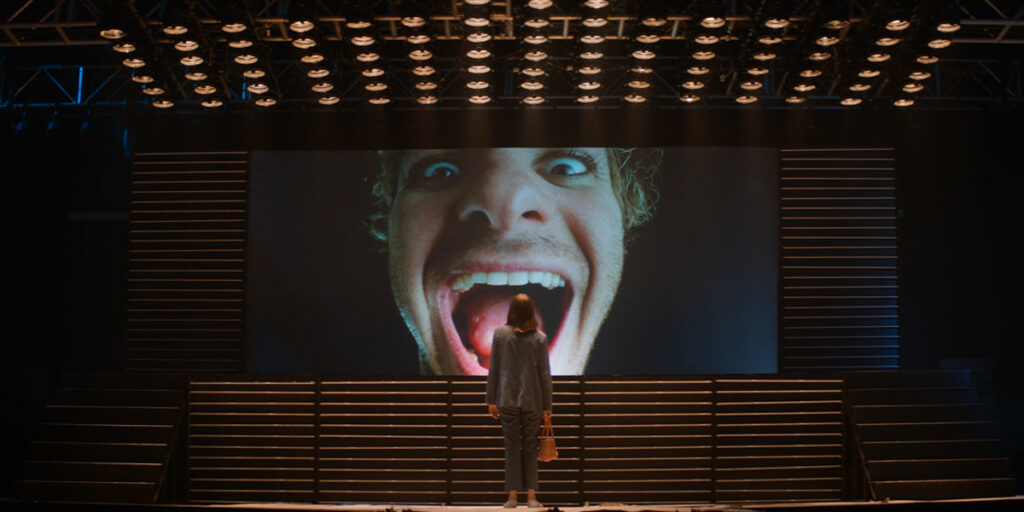Mainstream tackles one of the most debated themes of our time in an interesting and innovative way: the (at times, unhealthy) relationship some of us have with social networks and their stars, the Influencers.
Read our review of the film Mainstream in Italian!
Frankie (Maya Hawke), a young and unfulfilled barmaid from Los Angeles who is suffering from the recent loss of her father, spends most of her spare time taking videos on her phone. One day, in a shopping centre, she meets Link (Andrew Garfield), a magnetic, anti-social boy who stages an improbable, impromptu “show” for her. Charmed by the boy’s performance, Frankie records him and uploads her footage to YouTube, and the video goes viral in no time. Certain that the boy has the potential to become a popular influencer, the girl decides to involve him in creating a series of clips, together with her colleague Jake (Nat Wolff). With the new name of “No-One-Special”, which Frankie herself assigned to him, the boy achieves web stardom, but “with great power comes great responsibility”, and Frankie soon becomes acquainted with Link’s new and dark, but no less captivating, face.
Mainstream is a very interesting film that comes very close to becoming a masterpiece. Gia Coppola crafts a product that is riveting, captivating and well-balanced in all aspects, approaching an apparently banal theme from a new point of view, with an audacious but also self-aware direction (even in knowing when to set itself limits) and the right actors at her side, such as an Andrew Garfield like you’ve never seen before. It’s a shame that the rhythm slows down towards the end, achieving a “rushed”, less incisive ending than the one one might have expected, even though it’s still “right” in its content, and with a triumphant Garfield.

Mainstream‘s undisputable protagonists are the world of social networks and the stars that inhabit it and emerge from it: the Influencers, a symbol of a society in which communicating gets harder every day, and where our real identity and the one we use online often run side by side, across parallel continuous lines that (one hopes) will never cross. It’s a society that’s always on the lookout for new role models, people who are able to provide us with increasingly immediate, simple answers: far, yet ever so “near”, they make everything appear easy and quick, and they seem to have an opinion on all subjects. They influence the masses, whose sensitivity and empathy towards a reality that exists “beyond the internet” becomes thinner and harder to grasp everyday, adding to the absence of that kind of understanding of things that can only derive from in-depth analysis and the development one’s own critical conscience.
Within this framework, Frankie, a young and potentially talented director, represents reflection and intuition, a world of study and content that builds itself up day after day, pulsating of a desire to be recognised and loved. This desire is devoured and consumed through the larger-than-life, uncontrollable Link, who is as shiny and eloquent as he is devoid of real contents, as the mirror of a society that builds itself on appearences and aggression. Jake’s disgust is the only source of common sense: in love with Frankie since forever, Jake isn’t able to actively intervene on Frankie and Link’s story even though he can to foresee its inevitable epilogue, and ends up stepping away from the situation.
Visually speaking, Mainstream‘s narrative develops gradually, following its protagonists’ evolution: starting from the intertitles typical of silent cinema, used to introduce Frankie and Link’s romantic, dreamy first meeting, the film evolves with an escalation of bright colours and visual references to the Sixties and the Seventies, periods of time characterised by a society that was more unhibited and excessive.
Maya Hawke is sweet and well-balanced, which is effective for the role. Her resemblance to her mother, Uma Thurman, is emphasised several times, from a “white shirt” dance scene with Link to certain shots of a blonde-haired Frankie looking straight into the camera, flashing before our eyes. Yet, it’s Andrew Garfield who carries the film home: excessive and unrestrained, he gifts the audience with a Link that’s both heinous and irresistable. Driven to the edge by narcissism and vulgarity, Link ultimately forces everyone to face the truth: we’ve all become empty boxes, unable to feel anything except for the very desire of not feeling empty, to the extent that we’d be willing to fill ourselves up with anything, at any price and as quickly as possible. There’s no room to absorb and comprehend, but just a bulimia of superficial content, shocking actions and well-phrased sentences that will never be enough to make us whole.
Mainstream is a film that succeeds both stylistically and narratively. Even if it is sometimes slow and its ending probably deserved a few more minutes to be developed in more depth, it is still proof that the talent of the Coppola family has not exhausted itself in the previous generation.
Mainstream premiered at the 77th Venice Film Festival on 4th September 2020. The film was released by IFC Films in US cinemas and on demand on May 7, 2021.

